#adaptation theory
Text
I've always found it a bit disappointing that Linda Hutcheon specifically excluded fanfic from her generally excellent discussion of adaptation in A Theory of Adaptation, because I do think fanfic is more akin to adaptation than probably any other thing it gets compared to.
Like, for me, what makes both really intriguing are questions like:
How does this story function as a story in its own right? How do you experience it if you don't know its source material? Does it work? Do you need certain kinds of background knowledge? Are people likely to experience it separately from its source or other versions of the source even if they are familiar with them?
How is this story engaging with the original or previous version it's working off of? What does it consider essential to keep from its source or canon? What is it willing to change? What assumptions govern both of those things?
How does this particular story take part in wider trends in storytelling that may or may not have anything to do with its source or canon? Where do fads or norms in broader storytelling contexts come into play? (For instance, film adaptations may resemble other contemporary films more than their source materials, fanfic goes through phases of popular structures, premises, and phrasings that cut through different fandoms. Or you can look at both in a broad cultural context beyond their immediate social context of fandom/film/whatever.)
I mean, I'm phrasing the questions in a kind of formal way, but I think the basic questions do factor into a lot of the more localized conversations that spring up around both adaptation and fanfic (whether specific adaptations/fics or general groupings of them). So much general discourse around fanfic revolves around the legitimacy of writing versions of pre-existing stories and it's like!! Adaptation is right there.
#fanfic and adaptation are not equivalent but that's not because there's some intrinsic qualitative difference#it's because fanfic is one subtype of adaptation among many#in my opinion but i /will/die on that hill#AND i think if we could get away from the matter of retelling stories and the flattening of this with stylistic quality wrt fanfic#and look at it more as a form of adaptation—yeah with far less barrier to entry than most etc but adaptation nevertheless—#then conversations about it might not involve so many boring unconsidered and incompatible assumptions#i mean. at the end of the day the biggest issue for a lot of people is that fanfic is cringe and adaptation has social cachet#but i do think it'd be helpful to talk—even critically—in adaptational terms rather than just kneejerk associations#(this rant was even longer originally but i'll stop there)#anghraine babbles#fanfiction#adaptation#adaptation theory#ivory tower blogging#sorta
44 notes
·
View notes
Note
okay, I’ve never seen Rings of Power and have no plans too, so talk to me about adaptation theory please??
absolutely, this is one of my areas of academic interest!! :D i'm mostly going to be discussing robert stam's beyond fidelity and thomas leitch's twelve fallacies in contemporary adaptation theory because they're available online, relatively short and sweet and approachable compared to many longer texts, and (leitch especially) written in quite accessible language. but many more people have written about adaptation theory and there's a lot more the field has to offer!
adaptation theory is about texts—which could be novels, films, plays, short stories, songs, operas, paintings, poems, TV shows, video games, and many more—being "translated" across medium and genre; what it entails, what it means, what it is. the novel is, of course, the paradigm: you might get the occasional short story or play translated into film, but it's mostly novels. (if you ask "why", well, that's a good question adaptation studies tries to answer. there's something to be said about a similar length and dramatic shape, but then again why not plays?)
leitch argues (and it's quite apparent from the relative dearth of material & time given to adaptation studies, in comparison to film and literature studies more broadly) that adaptation studies is a very peripheral, provincial pursuit. which is a bit sad and strange, because so much of modern media/literary consumption is adaptation. many (most?) films are adapted from novels (or given this day and age... comic books). fans clamor for worthwhile adaptations. but leitch says that the central question, "what happens when filmmakers set out to adapt a literary text?", is still more or less an unanswered one. leitch discusses dudley andrew's writing on adaptation: that in the future he hopes adaptation studies includes much more than questions of text-to-film, but also all studies of the signification, quotation, analysis of connotation, and reference that make cinema possible.
stam talks a lot about how what adaptation theory exists is mostly highly moralistic. it's almost always couched in terms of fidelity/faithfulness to the source—extreme literalness of translating text-to-other-text as the only way to go. he lists these frequently-used terms when talking about “bad” or unfaithful adaptations: "infidelity, betrayal, deformation, violation, vulgarization, and desecration." but what he introduces instead is a "beyond fidelity" look at adaptation, discussed further in his essay. ever since his essay was published in 2000, it's become a staple text for moving adaptation studies beyond fidelity as the only metric.
it's also important to think about how film is often used as the "spoonful of sugar" (to quote leitch) that helps literature go down—for example a “Shakespeare and Film” course. this is a symptom of the unfortunate truth that adaptation studies as it exists right now (in both academia and popular thinking) is founded on several "fallacious binaries":
literature vs cinema
high culture vs mass culture
original vs copy
there's a wonderful essay by seymour chatman called "what novels can do that films can't (and vice versa)". film can't describe like a novel; likewise a novel can't display a picture like a film can, but must choose which details to include and which to exclude. but in each medium there are different techniques to evoke a similar sense; a close-up in a film may be a rough approximation of a paragraph of description in a novel.
but over-extrapolating the fundamental differences between novels and film is also a tricky area—indeed, one of leitch's twelve fallacies is the idea that "differences between literary and cinematic texts are rooted in essential properties of their respective media." leitch argues very strongly that the differences between media are less than you think. he does this in attempt to break down the false binaries of literature vs cinema, high culture vs mass culture, original vs copy that so pervade cinema studies. i like this line of thinking because culture usually conceives of film as less than a novel, and an original text as superior to a "copy" in an adaptation (as if stories degraded over time like carbon), but it's simply not true. some of the time—much of the time!—adaptations are equal to and can even improve on the original text. either way, they stand on their own; whether or not a film is an adaptation doesn't actually have any bearing on its artistic merits.
that's another one of leitch's twelve fallacies, of course—the fallacy that novels are better than films by their inherent nature. there's a lot of thinking right now that films/TV degrade the brain, while novels improve your thinking. which is kind of dumb. you can read bad, trashy novels and not think about them, just as much as you can carefully analyze and dissect a great film's narrative. i'd argue that "reading" a film can take as much brainpower as "reading" a novel, our culture is just used to paying less attention to films because we're starting from the perspective that they're worth less.
besides, all texts are intertexts, meaning they're all informed by, inspired by, exist because of texts that came before. novels and films both. some are more obvious in their references than others, but it's a spectrum, not a binary.
critics of visual media may also argue that "you don't even have to use your imagination" with films/TV, which i admit was something i as a snide book-reading teenager regurgitated, but leitch (imho rightfully) says that this argument rests on the fallacy that the specific directions of novels don't already usurp the imagination in the same way. in this argument "imagination" as a concept is reduced to mere "picturing", but many other senses (smell, taste being evoked through shots in a film, for instance) are at play in both novels and films.
it's also a tad classist to claim novels are better than films, because this claim proliferated as films became the popular entertainment of choice among lower classes. (and novels were once seen as trashy too! the cycle continues.)
okay, this is getting long, so i'll steer things back to the fallacy of fidelity. stam maintains there's a grain of truth to the fidelity argument because it expresses disappointment in the specific interpretation, someone else's interpretation imposed over and subjugating our own, which is a valid emotional response. but the concept of fidelity remains problematic as a methodology. strict faithfulness is impossible because a novel's text is often symbolic, and details are excluded by necessity. films must always create sets, costumes, and character behavior based on little more than a few details (and really, just the "flavor") mentioned in a novel. novels are told in "single tracks"—text only—whereas films have not only spoken dialog and moving image but music, foley, physical locations and objects, and potentially voiceover, on-screen text, and so on; in its essence it's more complex and a potentially richer source of narrative information. besides, novels are large texts that can generate many meanings; hunting for a "kernel of truth", the text's single essence, is fruitless, because every reader will come away with their own. all this fidelity discussion fits neatly into the false binaries of literary text as superior to cinematic text; films somehow subservient to their literary overlords. but enough of that! films can and should be and do their own thing.
that said, there are still "close" and "distant" adaptations, and an entire spectrum in between; i'm not saying that i'd be happy with a percy jackson adaptation that chucked the texts entirely in the trash. still, putting fidelity behind us, stam suggests the more helpful paradigms of "translation, reading, dialogization, cannibalization, transmutation, transfiguration, and signifying—each of which sheds light on a different dimension of adaptation" (62).
in conclusion, adaptation theory happily put an end to the fidelity-as-sole-metric thing, like, two decades ago, which is why yesterday yours truly had had quite enough, and blazed a tumblr post about really bad and outdated adaptation theory being applied to percy jackson/atla/rings of power adaptations promoting fidelity-first criticisms. robert stam killed that argument in 2000, babes, get with the times :)
this is the saltiest i'll get on the subject but: i really do think there's something very pitiful and wimpily self-protective about endless fidelity arguments for beloved texts—especially now that i'm 25 and not a snotty 14 year old claiming objective knowledge of what art is better than other art. unfortunately it's filtered into hollywood because of fan demand; showrunners now are always covering their butts about being true to the original because people will get mad otherwise. respectfully, fuck that. i want compelling interpretation, not factory-assembled rehashes of the same thing. original texts will always be original texts, and will always be better at being themselves than any adaptation. interpretation and re-interpretation is the nature of narrative.
22 notes
·
View notes
Text
I love this gay ass show with its literally life ending injuries that heal immediately, but only when convenient to the plot, and its ridiculous use of modern phrases, and its laughing in the face of historical accuracy, and its kissing the face of the fans instead of trying to outwit them, and the way everyone involved in the show seem to go 'I KNOW RIGHT! I'M EXCITED TOO!' instead of mocking the fans
#i have so many feelings#i can't quite express the way everyone involved seems to want us to love the show#like when you love something so you show it to a friend and vibrate with excitement while you watch them love it#so that you can scream about it together#it feels like djenks and the writers and the cast and the crew are in on the joke *with* us#which contrasts so sharply to the way so many fandoms find themselves to *be* the joke#the joke being how much we love the show#the fact that everyone involved cares *so much* about the show is really obvious#not just this is a fun show but this is a *meaningful* show#i truly have never felt so much like i have a community as i have with this show and the fans of it#it is also one of the only shows i can think of (maybe some of neil gaiman's adaptations?) where the trademark over analysing and meta#and theories of the fans isn't ridiculed#this ties back into the being in on the joke thing#back when we didn't know blackbonnet was going to be *canon* canon#and djenks reaction to us freaking out that we were RIGHT was basically#well yeah?#i want to write a love letter to everyone but i don't know how#ofmd#mine#our flag means death#david jenkins#ofmd s2#ofmd 2#kissing david jenkins on the mouth
3K notes
·
View notes
Text
[ cw: violence mention / death mention / ]
Will never stop thinking about how Leo, all alone in an endless void and being beaten again and again and again by the only other living thing around, still finds comfort in that space. The situation he was in was completely hopeless, and in any other circumstances he would not have escaped, at least not fast enough to save him from permanent (or even fatal) damage, be it physical or mental.
And yet, despite the bleakness of his situation, despite the agony and helplessness, all he needs is one glance at a crumbled photograph, one glance to remember his family, and that’s enough of a reason for him to smile.
Maybe that’s why his powers center around manipulating space - because no matter how much space is between them, no matter how dire his own situation may be, just the thought of his family, alive and okay, is enough to give Leo hope.
#rottmnt#rise of the teenage mutant ninja turtles#rottmnt leo#rise leo#the prison dimension is horrifying on its own#add in a monstrous being that towers over you and has vowed to ensure your suffering?#god I can’t imagine how scary that is#Mikey opening the portal was a miracle because if he hadn’t managed it there#it’s really up in the air what could have become of Leo#personally I subscribe by the theory that you straight up can’t die in the prison dimension#so it’s a prison in all ways#but the thought of a Leo who manages anyway who adapts and continues to have hope despite it all…#Leo saying he’s nothing without his family is a double edged sword really#because the thought of his family alone is all he needs to live. to hope.#to smile#nothing without them…but they’re EVERYTHING to him#and maybe he doesn’t realize it but…the feeling is mutual#one thing too is that hope that comforts Leo so much is not just that#should he think his family needs help - that hope can turn into determination#I’m unwell about this family#actually on my point of their powers - I truly do think the abilities tie in not only to their personalities#but to their relationship to family and love in general#kinda like love languages in a way#Mikey with his chains and time abilities values being around his family the most - he wants them to experience living in the moment togethe#Donnie is someone who is 100% a gift giver to show his love - his constructs are exactly that aren’t they? gifts of his mind#Raph is someone who willingly bears the weight of the shield - he protects his family like the best big brother possible#and Leo - he goes off on his own a lot but his mind is constantly on his family anyway#like a sailor at sea no matter how far he travels the compass always point in one direction - and for him that compass points home#even if he can’t make it back - it’s still there#and that’s enough
269 notes
·
View notes
Text
the more i think about it the more i feel transunity is vital. i dont mean this hatefully and theres no way to say this that wont be misconstrued by someone but. i feel like so much trans activism has been focused on aligning trans women with other women in feminism (itself not a bad goal) but that as the end all be all of trans activism intrinsically hurts other trans people. so much baeddel rhetoric relies on "there is no trans community/trans people it should only be about trans women" and i think its extremely extremely important to talk about transness as its own class, and fully embrace how trans liberationism must involve completely deconstructing cis-centric analysis of gender/the patriarchy to include the full extent of trans oppression. the idea that transphobia is fundamentally and exclusively based in misogyny & is ultimately a part of women's oppression is just fitting transness into the cis-centric binary system we've always had. transphobia has to be seen as its own thing and transness as its own class, for the better of all trans people and especially transmascs & transneutrals who are otherwise forced to choose between misgendering/detransition or being left out of class analysis/treated as oppressors even while being oppressed. transness is not just a subsect of womanhood it has to be seen as its own thing. transunity or death
#btw is there a word for being unfairly cast as an oppressor? bc there should be#not only for trans issues but for antisemitism#jewish people are FREQUENTLY treated as if they are privileged to cover up/ignore/gaslight them abt their oppression#another similarity btween transandrophobia & antisemitism#anyways i strongly believe that so much feminism is built off of cissexism & binarism#and it has to be radically reworked for trans liberation#transness should not be shaped to cis feminism we need to adapt feminism for the needs of trans people#ALL trans people. enough treating nonbinary people like we are a footnote we need radical changes to fully realize us in social theory#m.#transandrophobia#transunity#transunitism
1K notes
·
View notes
Text
thank you @mafaldinablabla for the tag!! the game is to share 9 of my favourite books from the last 12 months, or 9 books on my tbr list for this year.
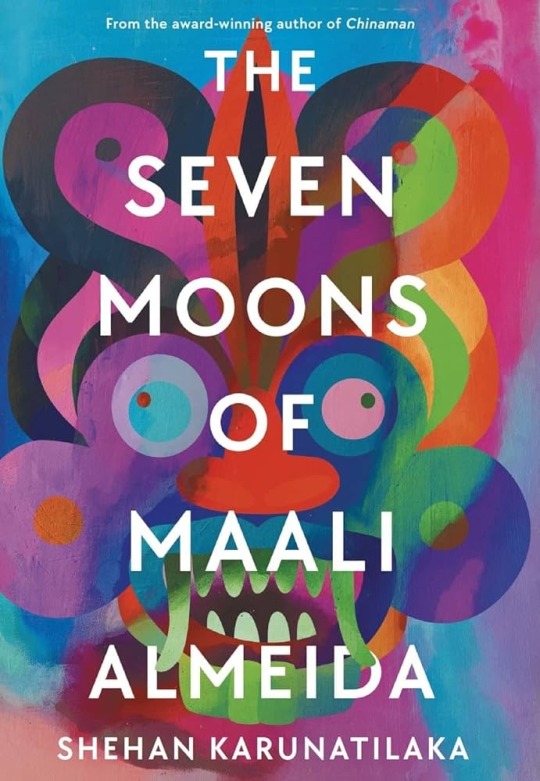
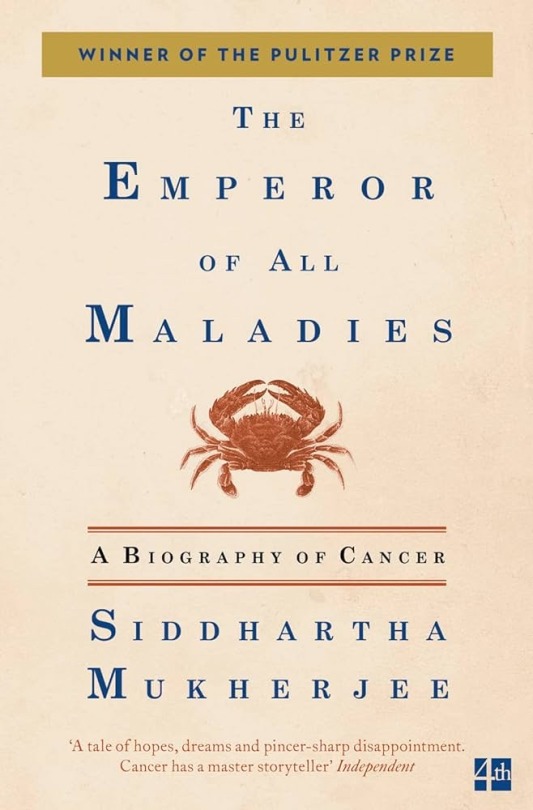
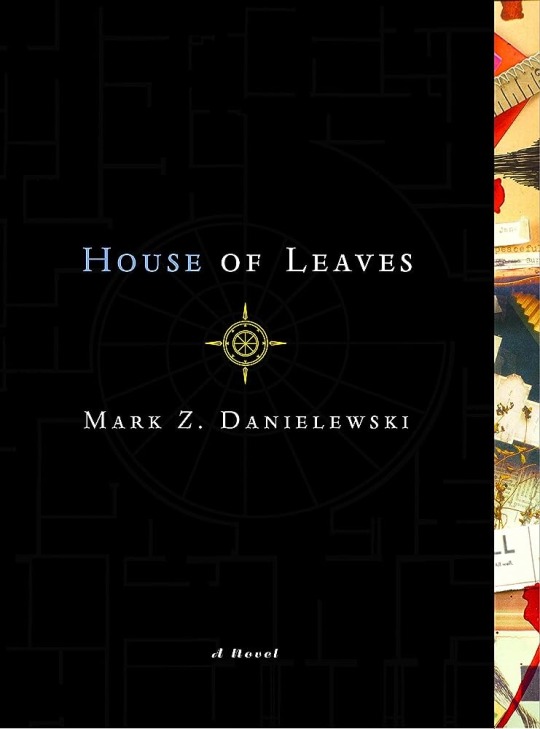
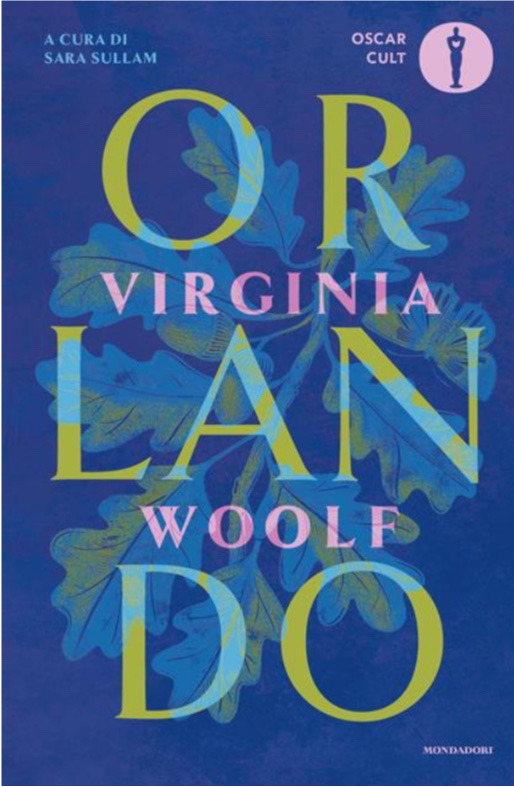
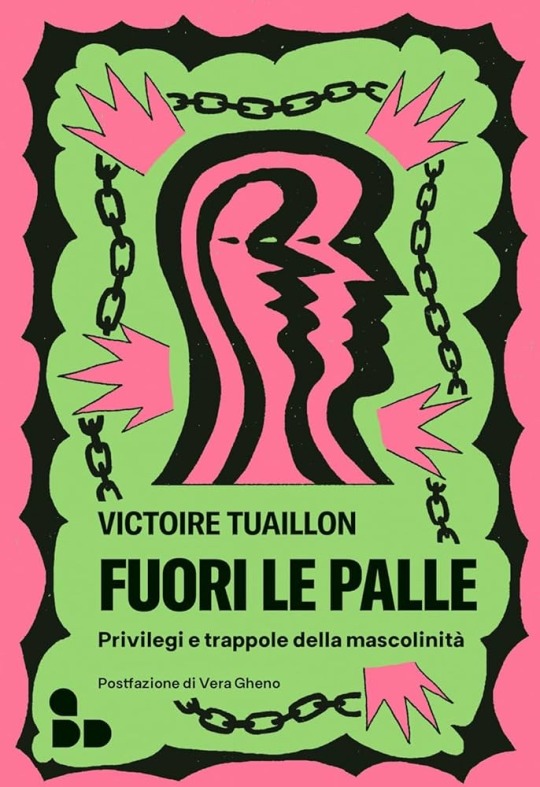
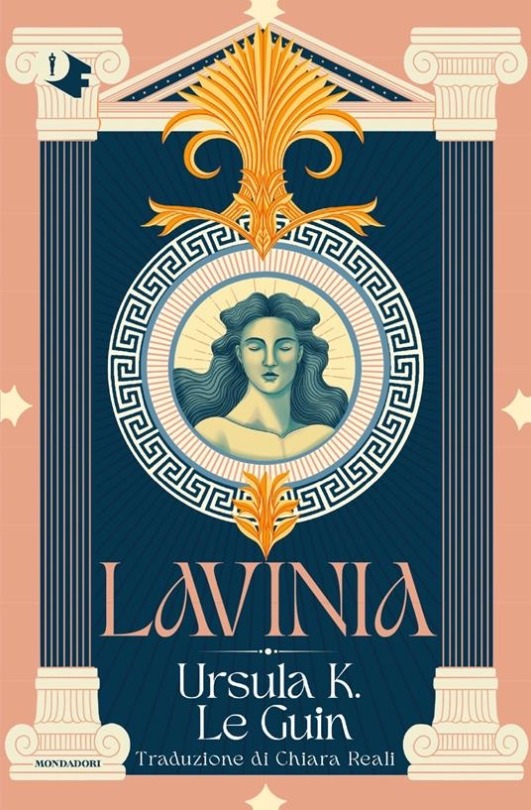
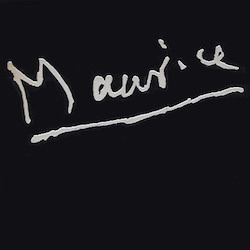
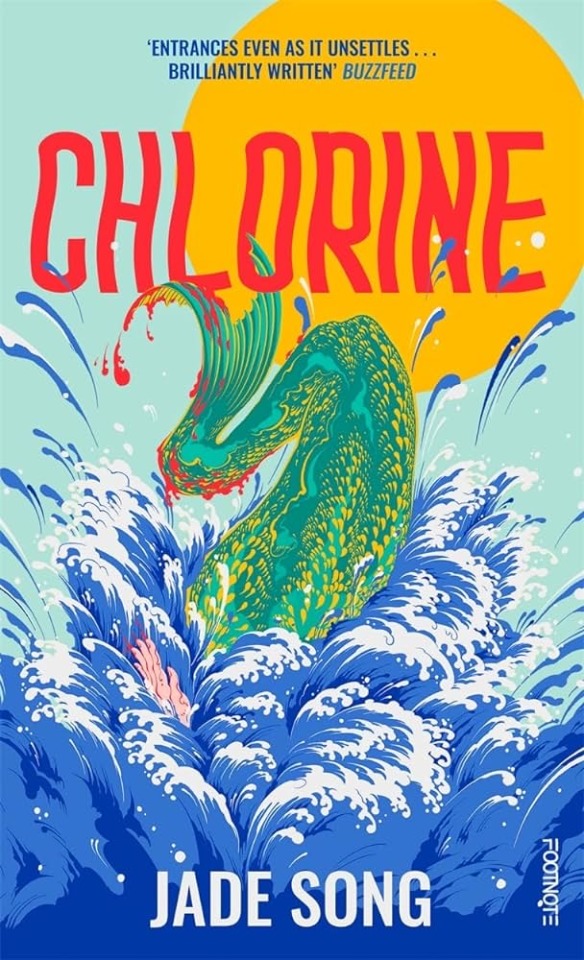
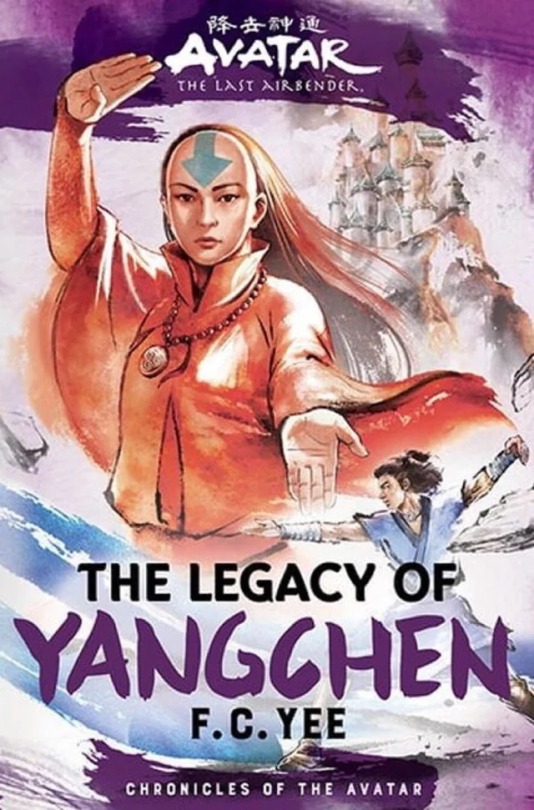
Here is what i’m looking forward to read this year! (my hunt for beautiful covers never ends. in this house books Shall be judged by their cover)
tagging uhh @erisenyo, @chitsangenthusiast, @ranilla-bean, @poikilotherm, @kyoshialone and whoever else wants to do it u.u
#also i really wanted to read the iliad but idk if there is a good prose translation/adaptation of it???#if any of italian moots has come across one…#blease tell me... blease hmu#ive also been meaning to get more into uhh#social theory books?#if that’s the word?#but idk where to begin#esp bc i read on a short commute and i usually don’t have the brain space to engage with academy level texts#again if someone know a version of this for tired dummies lmk#ALSO cheating a bit bc i already started the seven moons of maali almeida and i’m loving it sooooo much#plus jorjus cover#so rlly the perfect book#realizing i should prolly start a book tag hmm#anyway#send post#oh I'm also looking forward to finish the murderbot diaries it's slow going but I'm halfway through and they're so good
105 notes
·
View notes
Text
you're embarrassing me in front of our incomprehensible managers!

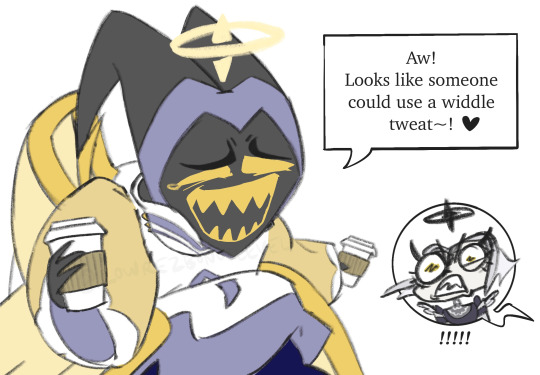

completely mystified by this ancient forum troll and his favorite kid emotional support sycophant
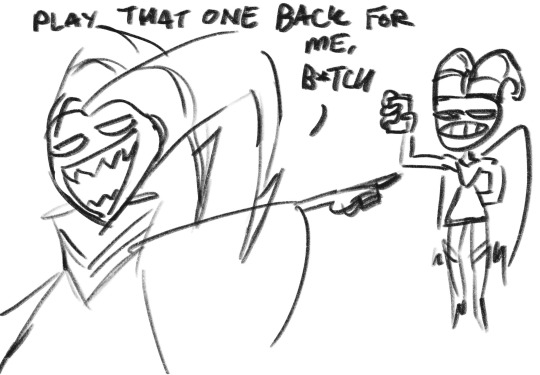

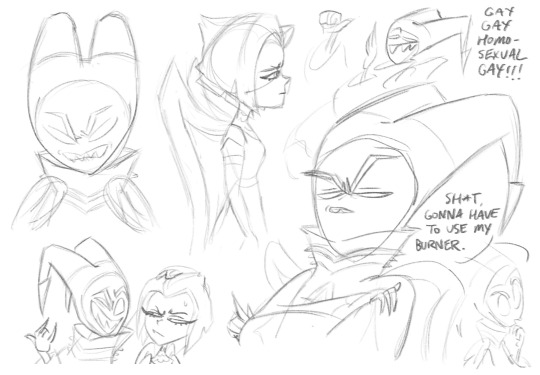
#hazbin hotel#lrblev art#sketch#comic#hazbin hotel lute#lute hazbin hotel#adam hazbin hotel#hazbin hotel adam#i find adam and lute to be underwhelming on their own. but they are possibly the funniest characters in the show when they interact#i have seen people ship them but i see them more as a father-daughter buddy-cop duo. rounds their characters out in a way#hope the “adam is a demon now” theory turns out to be correct. that would be funny#PS: the “little treat culture” comic dialogue is indeed adapted from that one twitter exchange#PPS: feel free to check alt text if you cant read my goofy handwriting
142 notes
·
View notes
Text
My best friend Sam has never read the Percy Jackson books. He is however, watching the Percy Jackson tv series.
Sam has very limited Percy Jackson knowledge that he has learned from the internet and in a call we had after he watched episode 2 he said to me "I know Annabeth is gonna be a pretty good friend to Percy." In another call we had after episode 3 I asked what he thinks of the Percy and Annabeth dynamic. He said "I think they could have a really cute friendship."
Now my question is, in which point in time do you think Sam is gonna realise that those two are supposed to get together. My bet is in season 4 when they have their first kiss and not a minute earlier.
#if you have any questions for sam btw about his opinions and theories I would love to ask him#I'm seeing him irl in a week I'm very excited!!#percy jackson#pjo#pjo series#pjo tv show#percy jackon and the olympians#percy jackson tv series#percy jackson adaptation#annabeth chase#percabeth#cal's basement
109 notes
·
View notes
Text
Things I won't forgive the fight club movie for regarding the character of Marla Singer, entry C:
The manic pixie dreamgirlification of her own struggle with life and death. The narrator gets to have a serious issue driving his alienation but Marla gets her cancer removed so her pithy statement about the tragedy of death being that she doesn't fall over dead randomly is just a bit Offbeat And Interesting And Edgy haha! She's a real tourist, really, nothing ever stated to be wrong about her. Sure she overdoses. Sure you can see she's got a shit life. But she doesn't get backstory. She doesn't get a life beyond fun little statements that, when her own reason for saying and thinking them is removed, mostly just reflect the narrator. In the book, it is very, very clear. Marla does what she does because she has cancer and is afraid of The Slow Death. The Wasting. The Struggle. By taking that away you even reduce her suicide attempt. It puts it all in this context of nothingness. Sure, you can assume a depth, but I don't think we should be uncritical about the fact that they chose to remove it. Marla Singer is more than an object that bothers the narrator out of the support groups and gets fucked by Tyler Durden. Marla Singer is a person in her own right in the book, and in the movie she's just... not.
#fight club#the other major beefs are: Marla is the one who intervenes and chases the narrator down so he doesnt shoot himself at the end. she's not a#fucking damsel in distress#it's arguable she 'saves'the narrator#those are two interlocking beefs...#secondly taking away her clarity of the situation and thus her own choices in the entire later half .....#in the movie marla arguably never even knows about the split personality thing!!! he doesnt fucking tell her!!! she just suddenly gets#pushed around by big brave masculine man protecting unknowing victim woman who is stupidly resisting#*vomits*#bro in the book marla is keeping this fucker awake. tracking him thru the night#she slaps him across the face#she makes the KNOWING CHOICE to persue him to the parker morris building#to remove her entire reason for how she acts then also make her entirely passive in the latter half of the movie when she was previously#quite active.....#literally aside from this and the defanging of project mayhem i consider this one of the best adaptations of smth ever#but they really fucking let misogyny ruin a major part of the story#sorry this is incorherent i'm just like#this is legit the only way people come up with those 'marla isnt actually real!!' theories too#because she's totally reduced from her own person into a mirage for the narrator's interest
58 notes
·
View notes
Text
ladytharen replied to this post:
did hutcheon say why she excluded fanfic? I'm curious if it was for very social cachet reasons.
IIRC, she specified that fanfic didn't "count" because of a very, hmm, interesting concept of fanfic as inherently uncritical of its source material. I can check for sure in a bit, though—I still have my copy.
Also, I think she did eventually release a later edition than mine that clarified some things, but I don't know if that was one of them.
4 notes
·
View notes
Text
sega what do i have to do to get an animated series that follows the sonic games. for the love of god how do i get this.
#I JUST WANT. A PROPER ADAPTATION.#you could stretch the classic games pretty damn far honestly#but please. give me a series willing to adapt before sa1 and after sa2#i love sonic x but the two worlds theory also kinda fucked them over#PLEASE. PLEASE.#sega official speaks
65 notes
·
View notes
Text
and like, I do understand plagiarism in certain cases. in my freshman year writing class, there was a girl who copied other people's stuff constantly. she copied other classmates, she copied me, she copied from random web sources, which, bad idea, don't do that, but I get why. she spoke english as a second language and freshman writing is a required course that was significantly harder for her than for everyone else in the class, and honestly I do not care if people manage to cheat off my school work as long as it doesn't get me in trouble if they get caught. but why on god's green earth would you decide to become a youtube video essayist, a job where you largely set your own deadlines and standards for quality, and plagiarize all your work? bro this can't have been your only option. do something else with your time. bro.
#even just pitching yourself as 'guy who makes adaptations of books about queer film theory' would have been substantially better. bro.#marina marvels at life
101 notes
·
View notes
Text
out here every fall like "no, the haunting of hill house isn't about ghosts, it's about the way that Nell's abuse, repressed sexuality, and desperate desire to be loved have manifested in extreme psychic phenomena that she can't entirely control! it's about the way that women bury their desires so deep that they fester and become malignant! it's about constricting yourself tighter and tighter until you become like the singularity that precipitated the big bang, until you become an awful force to be reckoned with, whether you want to be or not! it's about deciding whether to accept truth or safety! authenticity or happiness! it's about being driven to madness by the knowledge that the real world has no kind place for you, no safe, sane place where you belong, and so you choose the house, not sane, as your eternal resting place! it's about! dreams! even larks! and katydids! are supposed, by some, to dream! and without her dreams of love and power to retreat into, Nell can only live!!!!! not sane!!!!! in the house!!!!!!!!!
AND WHATEVER WALKS THERE WALKS ALONE."
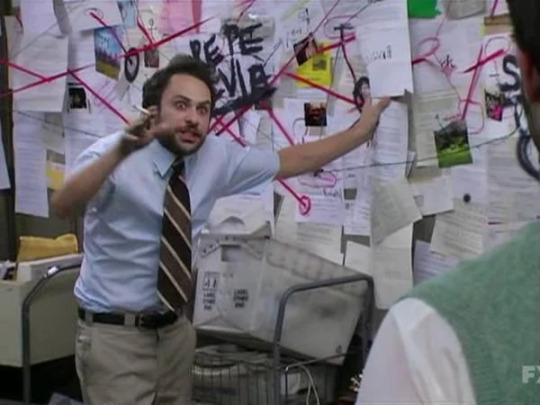
#I WILL FACE NETFLIX AND WALK BACKWARDS INTO HELL#it's one of my favorite books ever written and no one adapts it right ;A;#okay I know that the singularity theory is being questioned now but look let me have my metaphors#the haunting of hill house
145 notes
·
View notes
Text
"fifth race" this, "second evolution" that. I think the Tau'ri specifically are the foretold returned Ancients.
with very few exceptions, Earth is the only place that has people with the ATA gene
Earth is where the Ancients evacuated to after they lost the war with the wraith
the earth stargate programme is the one that has explored, rediscovered, and activated the most Ancient devices and bases (Antarctica, Atlantis, that ship in SGU, the Ancient libraries, all of Merlins stuff, all of Oma Desala's stuff, all of Morgan Le Fays stuff, the list goes on)
Earth has made contact with the Asguard, the Nox, the Tollans, the Wraith and some other allies
Earth has made contact with actual Ancients and even had at least one Ascend and come back (Daniel)
#stargate#stargate sg1#stargate atlantis#mushroom theories#the earth crew based in atlantis have been called atlanteans by many pegasus natives#and atlantis has been shown to work BETTER for the earth crew than for the ACTUAL ANCIENTS#which if we're going with the sentient!atlantis theory just proves my point in more ways than one#also if they arent the next or returned ancients how tf did they macgyver a dhd like that#the only people shown to build or adapt a gate are the ancients the asguard the nox and WITH HELP the tollan#and the asguard and the nox were part of a UN with the ancients so it makes sense that they can do that
97 notes
·
View notes
Text
i think an important point of distinction between nbc hannibal and the other various thomas harris adaptations is that in those previous adaptations the hannibal lecter actors have said yeah he’s a serial killer and he’s fucked in the head, he doesn’t realize what he’s doing is wrong, etc. but while nbc hannibal was in its early stages mads mikkelsen said i’m going to play hannibal as lucifer. the sexy man from the bible. and i think this change is the genesis of the fundamental tonal shift from a fact- and mystery-based story (as in previous adaptations) to an allegory-based one, and why thomas harris’s simultaneous horror of and fascination with transformation reads less as cartoonish trans- and homophobia and more like the tradition of 19th century gothic novels
#i swear i’m gonna read red dragon for realsies one of these days#i can’t keep doing adaptation theory without reading the original lol#ryddles
36 notes
·
View notes
Text
Dante is Ayin -> slep 💤
Don Quixote is a Bloodfiend -> 👀 👀
#limbus company#dante lcb#don quixote lcb#ayin#saw that theory on twitter and giving it some thought i like it#we haven't heard any bloodfiend lore for a while#and it isnt too weird considering how canto iii iv and vi were adapted#what is going through her skull really
29 notes
·
View notes